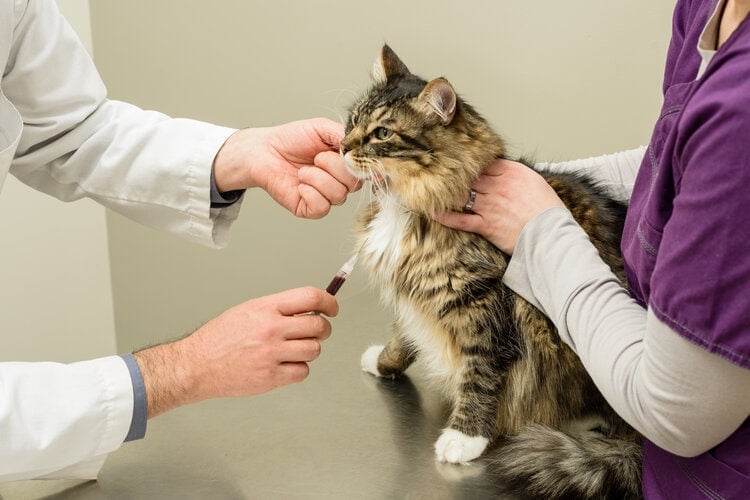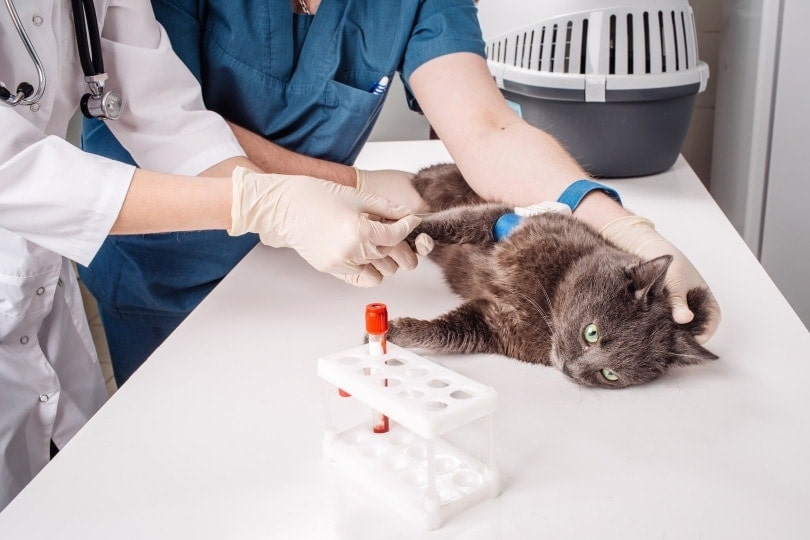Will a Blood Test Show Cancer in Cats? What Will It Show?
Updated on

There’s no denying the value of blood tests. They can diagnose many things, from infections to anemia. They provide veterinarians with information about your pet’s health that may not be evident. Cats tend to hide when they feel sick. It’s their way of not showing their vulnerability, so these tests may play a role in detecting disease and directing a course of treatment. Also, blood tests can show cancer in cats—sometimes. Keep reading to see why it’s complicated.
Defining Cancer
It’s helpful to begin by defining cancer to understand how blood tests may work for diagnosing this condition. Cancer isn’t a single disease but over 100 different ones. Each has its risk factors and chemical pathways that determine its course. As a catch-all term, it describes a situation where cells grow abnormally, whether their structure or numbers.
This out-of-control growth can cause tumors or spread throughout the affected organism’s body. It can affect any system. While cats are typically less susceptible to cancer than dogs, their risk increases with age, just like with people. It often begins with general signs, such as loss of appetite, lethargy, vomiting, or diarrhea.

Cancer and Blood Work
The answer to whether a blood test will help a veterinarian diagnose cancer is yes and no. It can help identify cancers that affect the blood, such as lymphoma or leukemia. Both manifest themselves as white blood cell anomalies. However, there isn’t a single test that can make a concrete cancer diagnosis across the board.
That doesn’t mean that blood work isn’t useful for diagnosing cancer, however. Instead, these tests can function as a red flag, indicating something is wrong. For example, several tests can highlight signs of internal inflammation. A check of a cat’s TK (thymidine kinase) levels could act as a biomarker or indicator of cancer while not explicitly identifying the disease.
Your vet can also test for other chemicals in your cat’s blood, such as calcium. High levels of this mineral are often a sign of a parathyroid gland tumor. If your doctor suspects feline leukemia, they may order an enzyme-linked immunosorbent assay test. Low cholesterol levels or hypocholesterolemia may be a sign of multiple myeloma. These tests provide your vet with more information to identify what’s happening.
In many cases, blood tests are a tool that veterinarians use to confirm a suspected cancer diagnosis. Remember that blood work often helps a vet gather more information about your pet’s health to work through their list of differential diagnoses. A vet may use X-rays, ultrasound, and fluid analysis. They may also biopsy any abnormal growths.

The Role of Blood Tests in Cancer Treatment
Blood tests are an excellent way to monitor your cat’s health during cancer treatment. Routine blood work can identify infections, anemia, or allergic reactions. Bear in mind that your pet is susceptible to side effects from cancer treatment or other diseases in their weakened state. Monitoring your cat’s overall well-being is a vital part of the healing process.
Thankfully, research is ongoing for more effective ways to identify cancer in the early stages when the prognosis is best. Perhaps one day, a test will exist that can be part of your cat’s routine blood work with their annual exam.
Final Thoughts
A cancer diagnosis is a scary prospect for any pet owner. However, it’s essential to remember that it isn’t a death sentence. Many animals recover from this devastating disease and live normal lives. While blood tests can’t diagnose all conditions, they can provide your veterinarian with valuable information for treating your cat while monitoring their health.
Featured Image Credit: SingingMedia, Shutterstock













